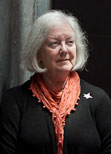June 17, 2009
Louise Lawrence-Israëls discusses her first memories of freedom after over two years spent in hiding with her family in an apartment in Amsterdam. In May 1945, Canadian forces liberated Amsterdam. Louise was three years old and initially had difficulty adjusting to the world outside the apartment, having never been outside for the duration of the hiding.
LISTEN
Esta página también está disponible en español.
TRANSCRIPT
LOUISE LAWRENCE-ISRAËLS:
We didn’t know this world, outside. We thought, if this is what it meant to be free, we didn’t want to be free.
NARRATOR:
Over 60 years after the Holocaust, hatred, antisemitism, and genocide still threaten our world. The life stories of Holocaust survivors transcend the decades and remind us of the constant need to be vigilant citizens and to stop injustice, prejudice, and hatred wherever and whenever they occur.
This podcast series presents excerpts of interviews with Holocaust survivors from the United States Holocaust Memorial Museum’s public program First Person: Conversations with Holocaust Survivors.
In today’s episode Louise Lawrence-Israëls talks with guest host Dr. Patricia Heberer about her first memories of freedom after spending over two years in hiding with her family in an apartment in Amsterdam. Louise and her family were liberated in May 1945, and three-year-old Louise had difficulty adjusting to the world outside the apartment.
PATRICIA HEBERER:
But you remembered that day when your parents first took out outside? That was that day, right? The day of liberation?
LOUISE LAWRENCE-ISRAËLS:
They waited a day to make sure that it was safe and then they, my parents, took my brother and myself to the park we had lived across from for three years. And they put us on a grassy field, and first of all we had to walk down four flights of stairs. We had never done that, and that was already strange.
Then we were standing there, on the grass field, and we were holding on for dear life because we’re really scared. And we looked at each other, and we wanted to go back inside. We didn’t know this world, outside. We thought, if this is what it meant to be free, we didn’t want to be free.
So we asked, we started crying and we asked if we could go back in. And my mom became all of a sudden so sad that she started crying. And I remember that, and even though we went inside, she must have cried the rest of the day. She couldn’t stop any more. All this tension kind of went.
But children are resilient. They told us–they told my brother his name, they told me my name, and I guess two days later, they tried it again and took us outside. We didn’t want to but, you know, what your parents tell you, you do.
So on the street walked all these Canadian soldiers, and they had nice crisp khaki uniforms and we had old rags. But the best part was, they smiled at children, and a child feels if a person is good or not, in general. So, besides smiling and trying to talk to us–and we had no idea what they were saying because we did not speak English–but they pulled Hershey bars out of their pockets and gave us Hershey bars.
You can imagine–the next day we wanted to go out again! [laughter] And get some more Hershey bars.
PATRICIA HEBERER:
Can you tell us what your life was like in those immediate postwar years?
LOUISE LAWRENCE-ISRAËLS:
My parents made a decision that they were never going to talk about the war experience. They were too sad. We lost a lot of relatives, and they were sad, but they didn’t want to burden us with that. So we should have a normal life and not know anything else.
They did not want to have anything to do with religion, because if you were religious and you belonged to a group, you were on a list, and they were always afraid of that, all their lives. And it doesn’t work that way, of course; you’re always on a list.
I remember when my dad thought it was time for us to have passports, and when the passports came they were not like they are today, they were just pieces of paper. Today it’s plasticized for security and all that. But he taught us that if we came in a situation that we didn’t trust, we should rip our name page out of the passport and chew it up and swallow it. And he made us eat paper, to taste what it was like. They were afraid all their lives.
NARRATOR:
You have been listening to First Person: Conversations with Holocaust Survivors, a podcast series of the United States Holocaust Memorial Museum. Every Wednesday at 1 p.m. from March through August, Holocaust survivors share their stories during First Person programs held at the Museum in Washington, DC. We would appreciate your feedback on this series. [Please take our First Person podcast survey (external link) and let us know what you think.]
[On] our website you can also learn more about the Museum’s survivors, listen to the complete recordings of their conversations, and listen to the Museum podcasts Voices on Antisemitism and Voices on Genocide Prevention.


